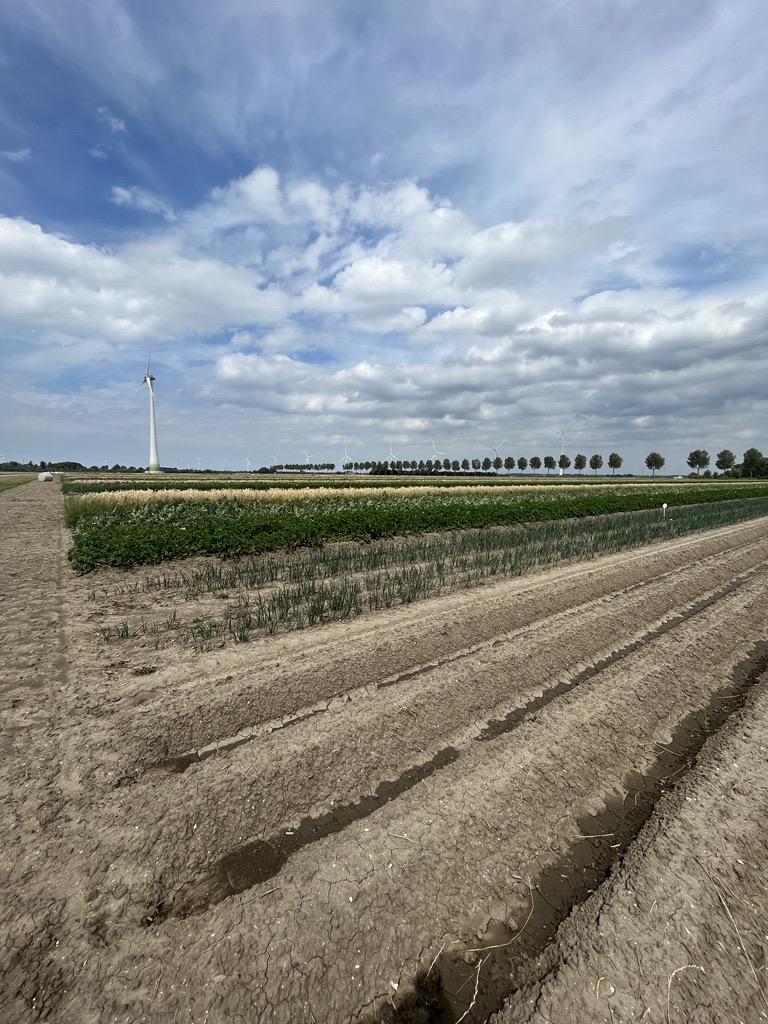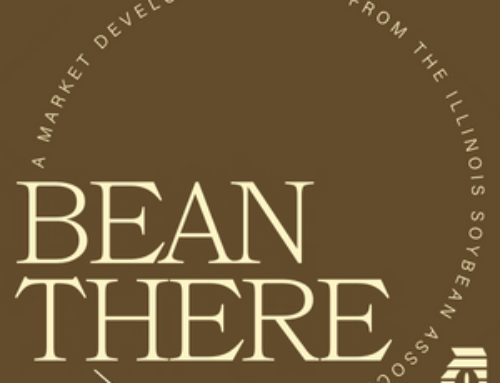Members of the Illinois Soybean Association (ISA) board and staff recently visited Amsterdam, Netherlands to explore increased market opportunities for Illinois soybeans, and to grow the team’s awareness on global sustainability practices. Because Dutch farmers are facing regulations such as the reduction of pesticides by 50 percent and fertilizer by 80 percent by 2030, and because their summer seeded crops must be harvested by a set date in the fall or they face fines of up to 5000 Euros a day, the ISA Soybean Production Committee set out to better understand what research and thinking was driving these regulations.
The group’s first stop was at Danone, a French multinational food-products corporation with a focus on creating sustainable eating and drinking practices. Familiar brands include Silk, Organic Horizon, Activia, International Delight, Oikos, and Evian. Danone is the #1 selling company worldwide for plant-based foods and beverages, #1 worldwide for fresh dairy products, #2 worldwide for packaged waters, and #2 worldwide for early-life nutrition. The team met with the soybean and dairy procurement staff to discuss how Danone works with farmers to implement sustainability measures. Because of Danone’s global supply chain, they work with local organizations to implement conservation programs that meet farmers where they are.
The next stop for the ISA team was Farm of the Future. The Farm of the Future is a vision from the Dutch Ministry of Agriculture for future-proofing the agricultural sector in the Netherlands in what they call “Circular Agriculture.” Some of the goals of Circular Agriculture are to restore and maintain natural resources, create a production system with resilience to climate stressors like flood or drought, and end the exploitation of finite resources such as fossil fuels and phosphate. The Dutch cropping system includes potatoes, tulip bulbs, onions, carrots, and sugar beets with cereal crops such as wheat, barley and corn as rotational crops to reduce the tillage associated with the growth of root vegetables. Research at the Farm of the Future included planting these crops in strips, to increase the biodiversity in the soil. While they were having some success in a research setting, researchers were skeptical that this type of cropping system would be widely adopted by Dutch farmers and were using data from their research to work with the Dutch Ministry of Agriculture to find additional solutions.

On day 3 of the trip the team toured the Port of Rotterdam, the largest port in Europe which serves as a major distribution hub for soybeans entering Europe. Its well-developed transportation networks, including road, rail, and inland waterways, allows for efficient distribution of raw materials, like soybeans, to various European countries, facilitating easy access to European markets. ISA International Markets Manager, Eileen Urish, described, “Visiting the Port of Rotterdam was a highlight on this visit to the Netherlands. The port has a rich history and continues to be a global leader in transportation by expanding to facilitate more efficient shipments to accommodate for growing demand.”
During the port tour, staff visited the first self-sufficient floating dairy farm in the old part of Rotterdam port. The goal of The Floating Farm is to supply high-quality dairy products to local consumers without a long food supply chain. Production is taking place close to consumers in a sustainable and efficient manner. “Visiting the Floating Farm was interesting from an ag tech perspective. While this isn’t a business model that will become the norm in dairy production, this was a great opportunity to introduce folks from outside of agriculture to the importance of maintaining a resilient food chain,” says ISA Agronomy Programs Manager, Megan Miller.
The trip wrapped up with farm visits. First with Dr. Corné Kempenaar, researcher and professor of precision farming at Wageningen University and Research, and his collaborators to tour field plots. Wageningen University and Research is rated as the world’s #1 agricultural university, which was reflected in the research demoed to the ISA team. Dr. Kempenaar’s lab focuses on the development of precision technologies and algorithms that farmers can use to make fungicide and fertility rate and timing decisions. This technology will be imperative for Dutch farmers as they work to reduce their pesticide and fertilizer use in preparation for their 2030 deadline.
The final destination for ISA staff was a tour of Pieter van Leeuwen Boomkamp’s 396-acre farm. At the farm, Blomkamp implements biodiversity, with acres of potatoes, sugar beets, silage maize, wheat, onions, carrots, fodder beet, and even 22.2 acres of grassland. He is a Dutch leader in precision applications, irrigation techniques, and minimum tillage across all acres. This meeting was a great opportunity for the ISA board to see Dutch agriculture in action and speak farmer-to-farmer about production efficiencies, technology, and impending regulations.
Overall, the trip was very successful in investigating the impact of intense regulations on crop production. The board and staff gained new global insights and data-based information, which they’ll use to work with researchers, consumers, CPGs, and policymakers on the importance of maintaining the balance between environmental goals and food production.
